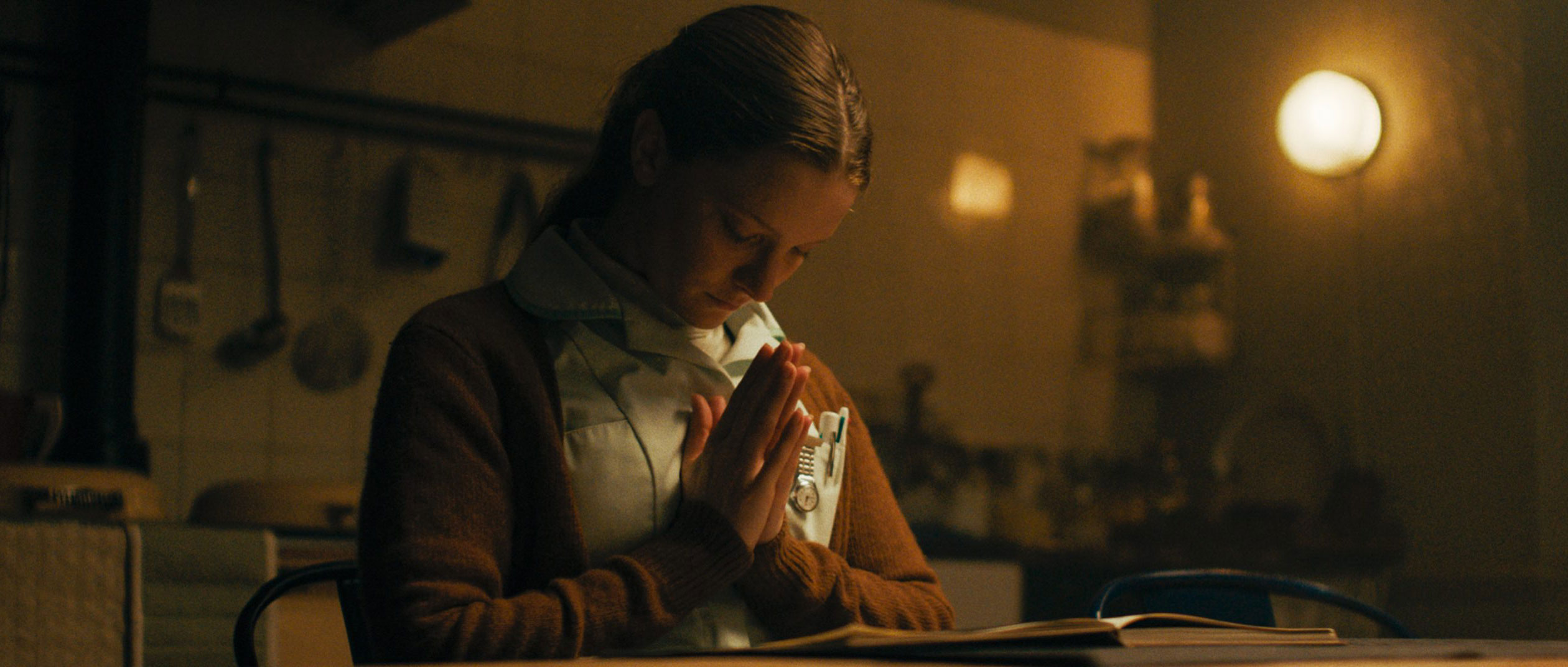
Director: Rose Glass
Writer: Rose Glass
Cast: Morfydd Clark, Jennifer Ehle, Lily Frazer, Lily Knight
Producers: Andrea Cornwell, Oliver Kassman
Music: Adam Janota Bzowski
Cinematography: Ben Fordesman
Editor: Mark Towns
Cert: 15
Running time: 83mins
Year: 2019

What’s the story: The unsmiling Maud (Clark) is private nurse to capricious terminally ill dancer Amanda (Ehle). Gripped by religious fervour, Maud believes she can save Amanda’s soul.

What’s the verdict: After Abner Pastoll’s A Good Woman is Hard to Find, Rose Glass’ outstanding feature debut is the second film this year to open with a young woman coated in blood. Like Pastoll’s movie, Saint Maud glues itself to the titular character to uncover what has happened and features a star-making performance from its lead.
Said lead is Morfydd Clark, her Maud visibly disintegrating as she strives for religious salvation from demons plaguing her. Maud believes redemption lies in Amanda (Ehle), a hedonistic dancer now in the late stages of a terminal illness. If Maud can save Amanda’s soul then she can save herself.
But, what if Amanda does not want saving?
Glass’s script is superficially similar to the Single White Female thrillers of the 90s, but she jettisons hollow titillation for something far more provocative. Imagine Fatal Attraction directed by Carl Theodor Dreyer for an indication of what awaits.
As a study of psychosis Saint Maud bears comparisons with Taxi Driver. Right down to Maud’s flatly delivered voiceover that stands in sharp relief to her actions, plus a twisted Catholic guilt-cum-saviour complex.
Smart writing creates real characters from supporting players, who in standard thrillers are psycho-fodder before a climactic showdown. Lily Frazer’s witty, extroverted rival for Amanda’s affections is the frustrating opposite of Maud, while Lily Knight’s fellow nurse gets an uneasy scene when visiting her troubled colleague and old wounds reopen.

Sharply dividing reality from Maud’s fractured fantasy, while she is looking for light Ben Fordesman’s Gothic-tinged cinematography paints the world in thick shadow. Sickly greens and infernal reds are predominant colour schemes, and Glass either captures Maud in uncomfortable close-up, relegates her to the corners of unbalanced framing or swallows her in oppressive coastal scenery (Scarborough has rarely looked so bleak). Completing the unease are the disquieting rhythms of Adam Janota Bzowski’s Mica Levi-like score.
Ehle (resembling Meryl Streep more each year) hits a good stance between sympathy and torment. But, Clark is the revelation. Lightyears away from her turn as Dora the ditz in The Personal History of David Copperfield, this is a raw, powerhouse performance.
Whether attempting to be normal on a nightmare night out, self-flagellating or contorting her body and face in religious ecstasy, it is impossible to look away from what she has created. Comparisons with Vanessa Redgrave’s legendary performance in The Devils are apt.
A third-act dalliance with lightshow special effects briefly disrupts the carefully created tension. But, in the spirit of Christian charity we can forgive a bit of soul-selling when the rest of Saint Maud’s horrors are so heavenly.
Rob Daniel
Twitter: rob_a_Daniel
iTunes Podcast: The Movie Robcast

Pingback: FEATURE: My 2020 in Cinema